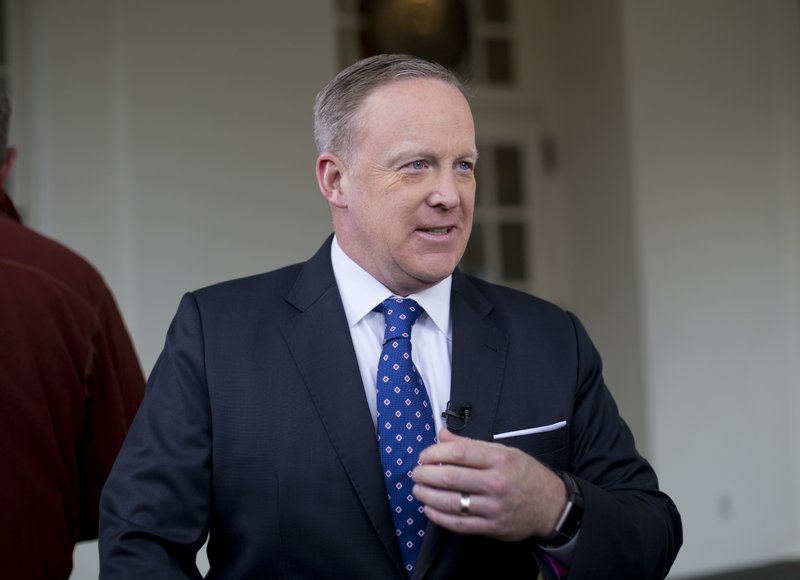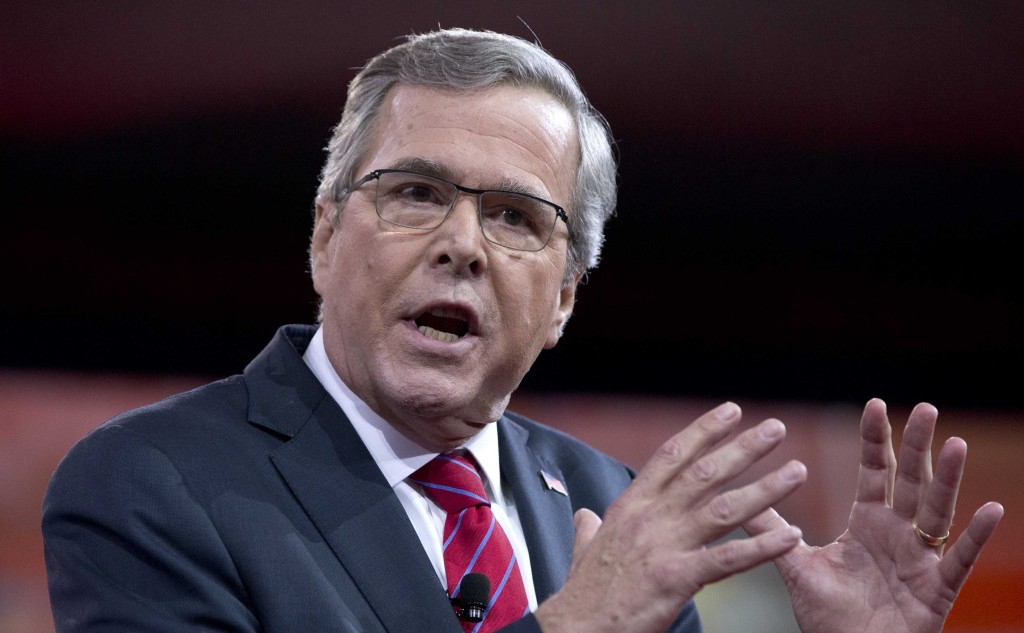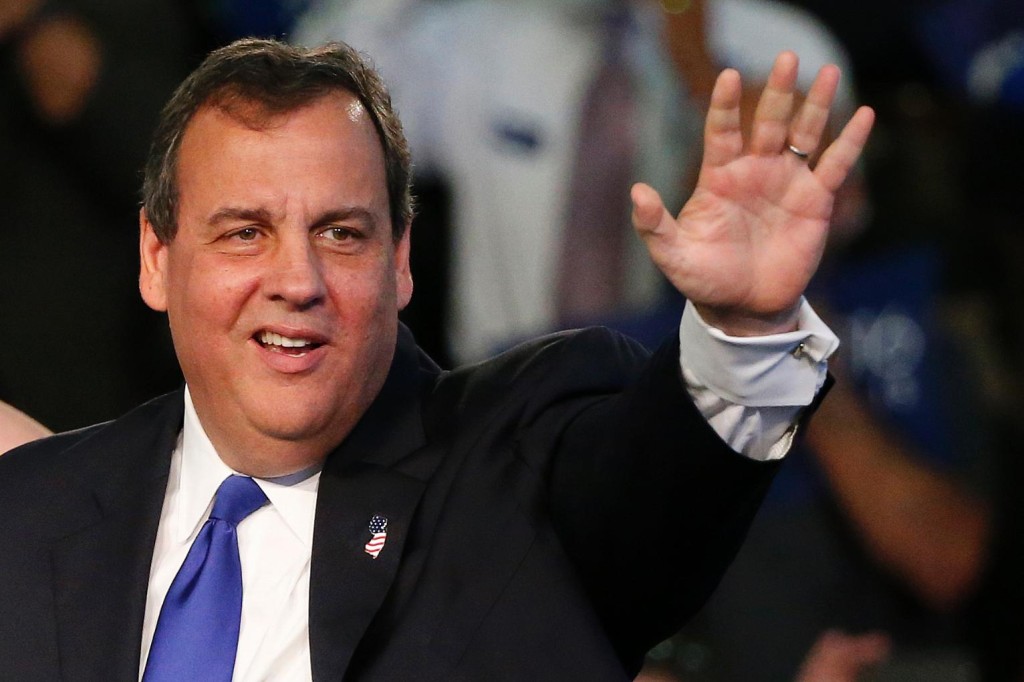Donald Trump adviser says gov’t has many ways to surveil people

Senior White House adviser Kellyanne Conway says she doesn’t have any evidence to support President Donald Trump‘s claim that Barack Obama wiretapped Trump Tower phone lines during the election. Instead, Conway is pointing to recent revelations about other government surveillance to suggest it was possible Obama used a different technique. Her response was unlikely to tamp down criticism of Trump’s tweets earlier this month. The House intelligence committee has asked the administration to provide evidence of the allegation by Monday. “The answer is I don’t have any evidence and I’m very happy that the House intelligence committee (is) investigating,” Conway told ABC’s “Good Morning America.” She later tweeted that the administration is “pleased” with the ongoing congressional investigation and “will comment after.” Trump’s critics have slammed the president for making the explosive wiretapping claim on his Twitter account without evidence. Wiretapping a U.S. citizen would require special permission from a court, and Trump as president would have the ability to declassify that information. James Clapper, who was Obama’s director of national intelligence, has said that nothing matching Trump’s claims had taken place. Also this month, WikiLeaks released nearly 8,000 documents that purportedly reveal secrets about the CIA’s tools for breaking into targeted computers, cellphones and even smart TVs. Conway noted that development to justify Trump’s claims. “What I can say is there are many ways to surveil each other now, unfortunately,” including “microwaves that turn into cameras, et cetera,” Conway told New Jersey’s The Record newspaper in an interview Sunday. “So we know that that is just a fact of modern life.” Conway told “Good Morning America” that “I wasn’t making a suggestion about Trump Tower.” She said she was answering a question about surveillance “generally,” and without specific reference to the current controversy. FBI director James Comey has privately urged the Justice Department to dispute Trump’s claim but has not come forward to do so himself. Sen. John McCain, an influential Republican, said Sunday: “I think the president has one of two choices: either retract or to provide the information that the American people deserve, because, if his predecessor violated the law, President Obama violated the law, we have got a serious issue here, to say the least,” the Arizona senator said. The House Intelligence Committee’s request for evidence by Monday was made in a letter sent to the Justice Department by the panel’s chairman, Rep. Devin Nunes, R-Calif., and its ranking Democrat, Rep. Adam Schiff, D-Calif., according to a congressional official. The aide wasn’t authorized to discuss the request by name and requested anonymity. Republished with permission of The Associated Press.
As president, Donald Trump seeks answers on his own wiretap mystery

If Donald Trump wants to know whether he was the subject of surveillance by the U.S. government, he may be uniquely positioned to get an answer. In a series of weekend tweets, the president accused his predecessor, Barack Obama, of ordering wiretaps on his phones but offered no proof to back the claim. The White House then called on Congress to investigate the allegations. But former government lawyers say Trump hardly needs Congress to answer this question. “The intelligence community works for the president, so if a president wanted to know whether surveillance had been conducted on a particular target, all he’d have to do is ask,” said Todd Hinnen, head of the Justice Department’s National Security Division during the Obama administration and a National Security Council staff member under George W. Bush. The latest storm began Saturday when Trump tweeted: “Is it legal for a sitting President to be ‘wire tapping’ a race for president prior to an election? Turned down by court earlier. A NEW LOW!” He followed up with: “How low has President Obama gone to tapp my phones during the very sacred election process. This is Nixon/Watergate. Bad (or sick) guy!” The Justice Department, not the president, would have the authority to conduct such surveillance, and officials have not confirmed any such action. Through a spokesman, Obama said neither he nor any White House official had ever ordered surveillance on any U.S. citizen. Obama’s top intelligence official, James Clapper, also said Trump’s claims were false, and a U.S. official said the FBI asked the Justice Department to rebut Trump’s assertions. Why turn to Congress, Trump spokesman Sean Spicer was asked Monday. “My understanding is that the president directing the Department of Justice to do something with respect to an investigation that may or may not occur with evidence may be seen as trying to interfere,” Spicer said. “And I think that we’re trying to do this in the proper way.” He indicated that Trump was responding to media reports rather than any word from the intelligence community. Other officials have suggested the president was acting on other information. Sen. John McCain, chairman of the Armed Services Committee, said Monday that Trump needs to give more information to the American people and Congress about his wiretapping accusations. “The dimensions of this are huge,” McCain said. “It’s accusing a former president of the United States of violating the law. That’s never happened before.” As for the genesis of a possible wiretap, it is possible the president was referring to the Foreign Intelligence Surveillance Act, a 1978 law that permits investigators, with a warrant, to collect the communications of someone they suspect of being an agent of a foreign power. That can include foreign ambassadors or other foreign officials who operate in the U.S. whose communications are monitored as a matter of routine for counterintelligence purposes. The warrant application process is done in secret in a classified process. But, as president, Trump has the authority to declassify anything. And were such a warrant to exist, he could theoretically move to make it public as well. If the president demands to know what happened, “the Justice Department can decide what’s appropriate to share and what’s not,” said Amy Jeffress, another former Obama administration national security lawyer. The Justice Department applies for the warrants in a one-sided process before judges of the secretive Foreign Intelligence Surveillance Court. Permission is granted if a judge agrees that there’s probable cause that the target is an agent of a foreign power. Though the standard is a high bar to meet, applications are hardly ever denied. Targets of wiretaps are not alerted that their communications are being recorded. Defendants later charged in the criminal justice system may ultimately learn the government intends to use at trial evidence collected through a FISA warrant, but they are not presented with the actual application for a warrant. “Unfortunately, the public has never seen an actual FISA application over nearly 40 years, so we don’t know exactly how the FISA Court has applied or interpreted the probable cause standard in this context,” Patrick Toomey, an American Civil Liberties Union staff attorney specializing in national security, said in an email. Trump also could have been referring to wiretapping authorized under the Omnibus Crime Control and Safe Streets Act of 1968. The Justice Department can obtain a warrant for that surveillance by convincing a judge that there’s probable cause to believe the target has committed or is committing a crime. The White House turned Sunday to Congress — which is already investigating ties between Trump associates and Russians — for help in finding evidence to support his assertions. Some Republicans seemed inclined to try to help Trump get answers. For Congress, getting to the bottom of this should not be difficult, said Dan Jones, a former Senate investigator and currently president of the Penn Quarter Research and Investigations Group. “It’s a knowable, ‘yes or no,’” Jones said. If the answer is there was no such warrant, he said, the next step would be to ask the president why he made the claim. “That information would then be investigated to find out if it’s right or wrong.” Republished with permission of The Associated Press.
Jeb Bush: NSA needs broader powers to combat “evildoers”

Republican presidential hopeful Jeb Bush said Tuesday that the government should have broad surveillance powers of Americans and private technology firms should cooperate better with intelligence agencies to help combat “evildoers.” At a national security forum in the early-voting state of South Carolina, Bush put himself at odds with Republican congressional leaders who earlier this year voted to end the National Security Agency’s bulk collection of phone records. The former Florida governor said Congress should revisit its changes to the Patriot Act, and he dismissed concerns from civil libertarians who say the program violated citizens’ constitutionally protected privacy rights. “There’s a place to find common ground between personal civil liberties and NSA doing its job,” Bush said. “I think the balance has actually gone the wrong way.” Bush also said the U.S. should send more troops — he didn’t say how many — and equipment to eastern European nations in response to Russia’s increasingly aggressive posture in the region. He said Russian President Vladimir Putin should know that his “adventurism” comes with “a price to pay.” “Rather than reacting to the bad behavior, I think we need to be more forward-leaning as it relates to what the consequences will be,” Bush said. The remarks were part of Bush’s ongoing efforts to pitch an aggressive foreign policy as he struggles to break out of a crowded Republican presidential primary in which businessman and former television reality star Donald Trump has garnered much of the attention. Pushing a hawkish foreign policy is a staple of Republican presidential politics. The exception is Kentucky Sen. Rand Paul, and even the libertarian-leaning senator has refused to take military action off the table as he argues for a reduced American footprint around the world. Yet for Bush, the discussion comes with particular challenges as he tries to distance himself from former President George W. Bush, the candidate’s brother, who signed the Patriot Act into law and oversaw the 2003 invasion of Iraq. Congress voted in June to end the bulk collection of American telephone records under the Patriot Act, a controversial program that NSA contractor Edward Snowden disclosed publicly in 2013. The Obama administration announced recently that the agency later this year would destroy all the remaining records that already had been collected. Bush doubled down Tuesday on his assertions that there is “no evidence” the data collection violated civil liberties. “I’ve found not one” case, he said. The Privacy and Civil Liberties Oversight Board, an independent bipartisan agency, declared NSA’s phone records collections program illegal in 2014, and a federal court of appeals reached the same conclusion earlier this year. A May analysis from the Justice Department found that FBI agents interviewed by the inspector general’s office “did not identify any major case developments” that came from using Section 215 that allowed the bulk records collection. Bush also criticized private technology firms for using encryption to make it harder for their customers to be surveilled. “It makes it harder for the American government to do its job while protecting civil liberties to make sure evildoers aren’t in our midst,” he said. Noting that companies like Google are getting pressure from customers, Bush said “market share … should not be the be-all-end-all,” and he called for “a new arrangement with Silicon Valley in this regard.” In outlining his policy toward Russia, meanwhile, Bush suggested his approach isn’t too aggressive and, in fact, is a U.S. duty as a member of NATO. “It’s not being bellicose to say what you’ll do if someone acts in a way that creates a threat to your allies,” he said. “That’s not warmongering.” Quite the opposite, Bush concluded: “History is full of examples of appeasement, pulling back and creating greater risk than standing up for your friends and allies.” Republished with permission of The Associated Press.
Chris Christie calls for new government surveillance powers

New Jersey Gov. Chris Christie offered a vigorous defense of post-Sept. 11 surveillance tactics on Monday, backing existing programs and calling for an expansion of intelligence-gathering capabilities even as Congress seeks ways to rein in the programs. Christie, who spent seven years as the U.S. attorney in New Jersey before he was elected governor, said that he had used provisions of the Patriot Act in pursuing terrorists after the Sept. 11 attacks and argued that the country must not weaken its anti-terror and surveillance laws. “We need to toughen our anti-terror and surveillance laws to give our services the legal mechanisms to do their job,” he said in a foreign policy-themed speech. A likely candidate for the Republican GOP presidential nomination, Christie took specific aim at former National Security Agency contractor Edward Snowden, who in 2013 leaked thousands of documents to journalists. Among Snowden’s revelations: NSA had for years been secretly collecting data about millions of Americans’ landline telephone calls. “When Edward Snowden revealed our intelligence secrets to the world in 2013, civil liberties extremists seized that moment to advance their very own narrow agenda,” he said. “They want you to think that there’s a government agent listening in every time you pick up the phone or Skype with your grandkids. They want you to think our intelligence community are the bad guys — straight out of the ‘Bourne Identity’ or some other Hollywood thriller. They want you to think that if we weakened our capabilities, the rest of the world would somehow love us more. “Let’s be clear, all these fears are exaggerated and ridiculous. When it comes to fighting terrorism, our government is not the enemy,” he said. Last week more than 300 House members voted to end the NSA’s bulk telephone records collection program, replace it with a system to leave the data with telephone companies, and allow the NSA to search the data on a case-by-case basis. The supporters of ending the program include Democrats and Republicans, and even the NSA doesn’t object to having private companies store the data. Independent reviews have found that the bulk collection program did not foil a single terrorist attack. Christie, however, slammed those pushing reforms as “intellectual purists” and insisted law-abiding citizens had nothing to fear from the surveillance efforts. “The vast majority of Americans are not worried about the government listening in on them, because it hasn’t happened. They are worried about what happens if we don’t catch the bad people who want to harm our country,” he said. Christie, who has said he will announce his White House plans by the end of June, spoke on the bank of the Piscataqua River, with the Portsmouth Naval Shipyard in the distance behind him. Throughout his speech, he painted himself as an antidote to what he described as President Barack Obama‘s weak leadership abroad. He argued the case for a more active U.S. presence overseas, bolstered by a larger military and increased defense spending. He also criticized president’s approach to the Islamic State militants and the emerging nuclear deal with Iran, as well as Russia’s backing of separatists in Ukraine and China’s encroachment in the South China Sea. “All these things are happening because American power is in retreat and we’ve backed away from the principles that made us a source of strength and stability,” Christie said. “No one understands any longer whom America stands with or whom we stand against. No one understands exactly what we stand for and what we’re willing to sacrifice to stand up for it. The speech is the third Christie has delivered in recent weeks in the early-voting state as he lays the groundwork for an expected campaign. His previous speeches focused on overhauling Social Security and reducing taxes on individuals and corporations. Christie has been working to re-establish his place in the top tier of likely candidates after the fallout from the George Washington Bridge scandal. He’ll hold his fifth town hall event in the state Monday evening. Republished with permission of The Associated Press.


